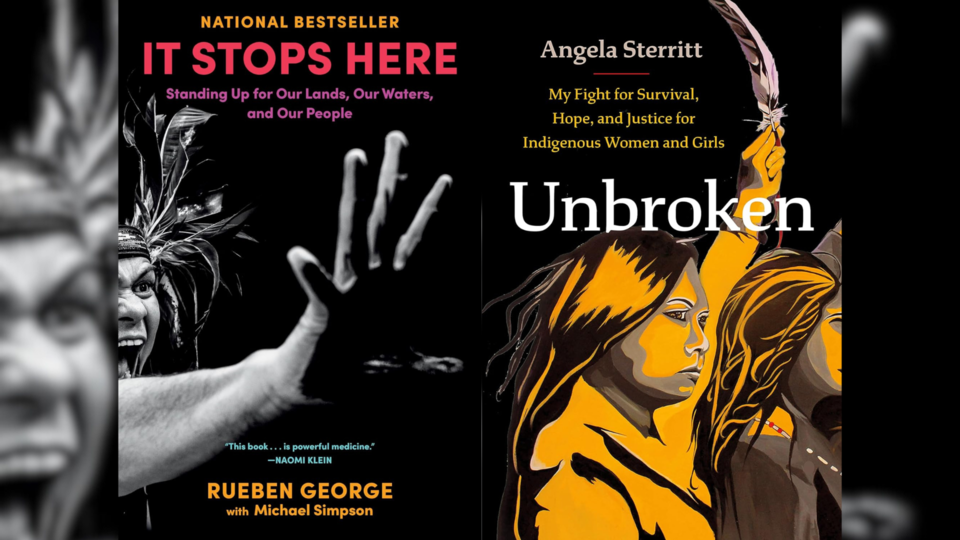One of the ways I’m trying to practice truth and reconciliation in my own life is by reading as many Indigenous authors as I possibly can. I’ve always been a voracious reader – it’s my favourite way to learn about the world – so reading is one way I can become a bit more knowledgeable about life for Indigenous people in Canada.
Two powerhouse memoirs I’ve read recently that are both local and extremely relevant are It Stops Here: Standing Up for Our Lands, Our Waters, and Our People, by Rueben George and Unbroken: My Fight for Survival, Hope, and Justice for Indigenous Women and Girls, by Angela Sterritt.
George is a grandson of actor Chief Dan George and a leader of the Tsleil-Waututh Nation’s fight against the Trans Mountain pipeline and Sterritt is a Gitxsan journalist, most recently working for the CBC for more than 20 years.
Sterritt tells her personal story of growing up on the streets of Vancouver, but it also covers the last 30 years of missing and murdered Indigenous women and girls (MMIWG) in Canada and the evolution of journalism about Indigenous people over those same decades.
“When I started my book in 2015, ‘racism’ was a no-no to talk about in the journalism industry. In 2017, ‘colonization’ was questioned in my stories. In 2019, journalists were not to give the reality of ‘genocide’ in Canada any weight. In 2021, all these rules began to break,” Sterritt writes.
This book is part memoir, part hard-hitting investigation into both Indigenous women and girls and journalism. Sterritt writes about covering the MMIWG inquiry, feeling torn between her role as a journalist and her role as an Indigenous woman. She writes about Vancouver’s Downtown Eastside and the Highway of Tears in British Columbia.
If you’re interested in the recent history of our province, this is a book for you. If you’re interested in the evolution of thinking about Indigenous people, the trauma of residential schools or the stories of families who testified about lost loved ones at the National Inquiry into Missing and Murdered Indigenous Women and Girls, this book is for you. If you’re interested in journalism, and how stories and perspectives change over time, this book is for you.
George’s memoir will also be of interest to many British Columbians, as it covers his childhood, when he can remember salmon so plentiful a cliff jumper could land on one, through his young adult struggles with addiction and his use of spiritual and cultural practices to recover, through his time fighting the pipeline.
But it’s much bigger than just the story of one man – it’s the story of naut’sa mawt, which means the interconnectedness of all things. If that’s not a big enough theme to catch your eye, I don’t know what would.
In one chapter, George writes about how this interconnectedness is missing from Vancouver’s downtown business district but can be found in the Downtown Eastside. He reminds readers that First Nations people are vastly over-represented in the child welfare system, among missing and murdered women, in prisons and in the homeless population – all because of the trauma of residential schools and because the violence of colonization continues today.
He encourages everyone to stand up for the Earth and says that even though the Canadian government bought the Trans Mountain pipeline, which the courts ultimately ruled to be in Canadians’ best interests, there is hope.
“I pray for this nation of Canadians to wake up, because it’s not too late,” he writes.
George is appearing at the Vancouver Writers’ Fest, as are several other Indigenous authors. Among them, I will also mention Michelle Good, whose novel Five Little Indians won the Governor General’s Award for Fiction and explores the lives of five children sent to residential school who later end up on Vancouver’s Downtown Eastside. Read it and learn. Good also recently wrote Truth Telling, a non-fiction collection of essays.
All three of these authors – and many other Indigenous writers – are telling stories we should all read, to enable a better future. We cannot have reconciliation without a profound understanding of the truth.
Tracy Sherlock is a freelance journalist who writes about education and social issues. Read her blog or email her [email protected].



